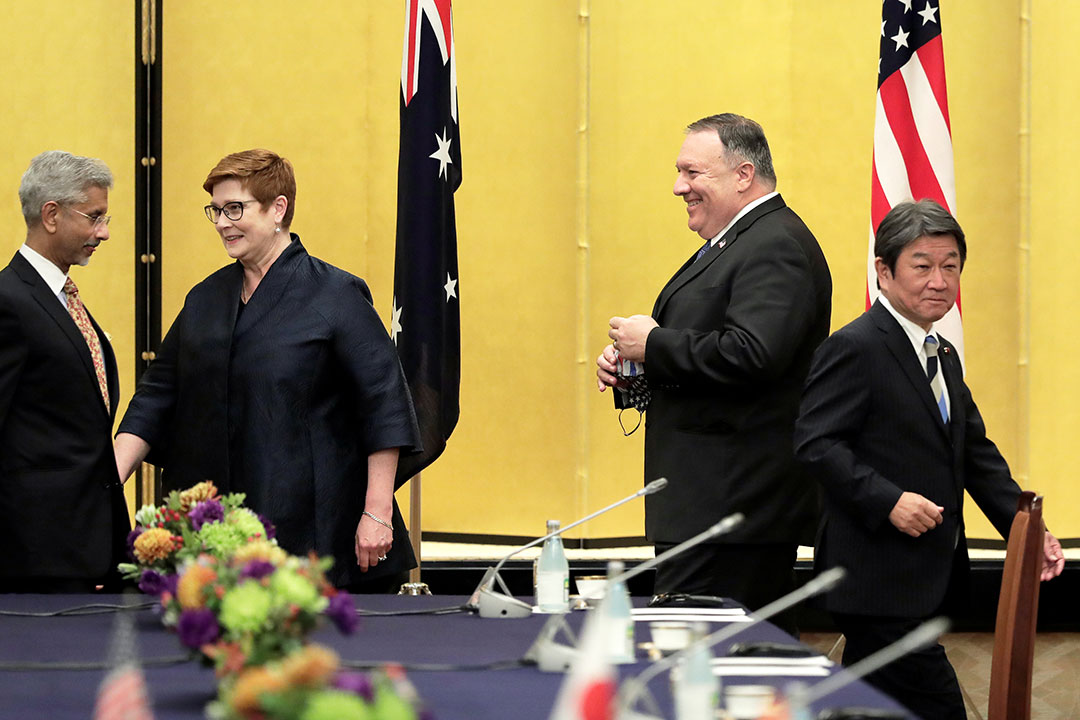Quad empowers India, collaborates on Free and Open Indo-Pacific strategies

A strategic grouping of the Indo-Pacific’s most powerful democracies — Australia, India, Japan and the United States — wants like-minded countries to join it in deterring People’s Republic of China (PRC) aggression and coercion.
Known as the Quad, the four nations say their informal grouping could include other nations that support a Free and Open Indo-Pacific.
“The Quad is a partnership driven by shared interests, not binding obligations, and is not intended to be an exclusive grouping,” U.S. Deputy Secretary of State Stephen Beigun said during an India-U.S. forum in Delhi in mid-October 2020, according to Reuters. “Any country that seeks a Free and Open Indo-Pacific and is willing to take steps to ensure that should be welcome to work with us.”
In particular, Quad partners hope to deepen engagement with the 10 member states of the Association of Southeast Asian Nations, Beigun said. His remarks underscore comments made a week earlier during a Quad meeting in Tokyo that included, pictured from left, Indian Minister of Foreign Affairs Subrahmanyam Jaishankar, Australian Foreign Minister Marise Payne, U.S. Secretary of State Mike Pompeo and Japanese Foreign Minister Toshimitsu Motegi.
Pompeo called the Quad a proud testament to the vision and legacy of former Japanese Prime Minister Shinzo Abe, who saw the collaboration as a vehicle to empower democracy in the region. Abe recently resigned, citing health issues.
“Our partnership isn’t multilateralism for the sake of it,” Pompeo said, according to a meeting transcript. “All of us seek a Free and Open Indo-Pacific, and our conversations aim to achieve that good outcome.”
Pompeo said the Chinese Communist Party (CCP) is a threat to that concept. He cited the CCP’s lack of transparency in its handling of the coronavirus outbreak as yet another example of the CCP’s destabilizing behavior in areas such as the South China and East China seas, the Mekong region, the Himalayas and the Taiwan Strait.
“The regime’s authoritarian nature led its leaders to lock up and silence the very brave Chinese citizens who were raising the alarm,” Pompeo said. “America stands with each of you as we work to achieve victory over this horrible pandemic and rebuild our economies together. As partners in this Quad, it is more critical now than ever that we collaborate to protect our people and partners from the CCP’s exploitation, corruption and coercion.”
Recent tensions in the Himalayas at the Line of Actual Control between India and the PRC has emboldened India to increase its regional profile and cultivate relationships that counter Chinese coercion. Analysts say that the PRC has worked to encircle India through strategic deals in South and Southeast Asia, including the China-Pakistan Economic Corridor, a collection of infrastructure projects with Pakistan. India has tread carefully to avoid antagonizing the PRC further, but aligning itself with the U.S. on shared interests will undoubtedly anger the CCP, according to Reuters. The goal of the alliance, Beigun said, is not to provoke the PRC but to empower India.
“We do not seek to change India’s traditions,” Beigun said, Reuters reported. “Rather, we want to explore how to empower them and India’s ability to defend its own sovereignty and democracy and to advance Indian interests across the Indo-Pacific region.”
Jaishankar affirmed the importance of the Quad and India’s commitment, according to the Quad ministerial meeting transcript.
“We remain committed to upholding the rules-based international order underpinned by the rule of law, transparency, freedom of navigation in international seas and respect for territorial integrity and sovereignty and peaceful resolution of disputes,” Jaishankar said. “Our objective remains advancing the security and the economic interests of all countries having legitimate and vital interests in the region.”
Payne, likewise, said Australia’s participation in the Quad highlighted the nation’s steadfast commitment to working together to promote an open, inclusive and resilient Indo-Pacific.
“It’s a diplomatic network that assists us as democracies to align ourselves in support of shared interests,” Payne said during the ministerial meeting. “We believe in a region governed by rules, not power. We believe in the fundamental importance of individual rights and in a region in which disputes are resolved according to international law. And we believe in regional security and recovery from COVID-19 that supports sovereign choices for the countries of the Indo-Pacific.”




